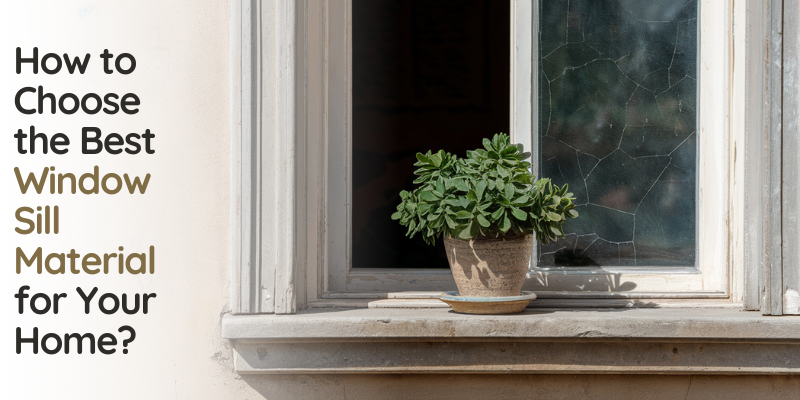Choosing the best window sill material for your home is an essential step in enhancing both the look and durability of your windows. Window sills not only add aesthetic appeal but also provide significant protection against the elements. With various materials available on the market, it can be overwhelming to decide which one is best suited for your needs.
This guide will help you understand the function of window sills, explore different material options, and identify the key factors to consider before purchasing.
The Function of a Window Sill
A window sill also referred to as a window ledge or bottom, plays a vital role in your window system. It serves as a structural and protective feature for your home. While some may think that window sills are purely decorative, they serve essential functions.
- Weather Protection: One of the primary advantages of window sills is their ability to direct rainwater away from the structure of your home, protecting your walls, floors, and foundation from water damage. A high-quality window sill material is crucial for ensuring this functionality.
- Support and Insulation: Window sills also support the window frame, ensuring it stays securely in place. Additionally, they help insulate your home by preventing drafts and contributing to better energy efficiency.
Material Options for Window Sills
When selecting the best material for window sills, there is a variety of options to choose from. Each material offers its benefits and is suited to different styles and needs.
- Timber: Timber is a traditional choice for window sills because of its natural loveliness and warmth. Advances in coating technology have made timber window sills durable and waterproof, ideal for indoor and outdoor use. However, timber requires regular maintenance to ensure longevity.
- Stone: Stone sills, often found in older homes, are extremely durable and weather-resistant. They require minimal maintenance and can enhance the aesthetic of brick or sandstone homes. Stone window sills, a common landscape product, add a timeless elegance to the exterior of any house.
- PVC: PVC window sills are becoming increasingly popular for their versatility and low-maintenance features. They can be manufactured to mimic the appearance of wood or stone, making them a practical and affordable option for homeowners looking for a long-lasting, low-maintenance solution.
- Aluminium: Aluminium is frequently used in commercial and apartment buildings because of its affordability and lightweight properties. However, it can be noisy when raindrops hit the surface. This issue can be mitigated by using soundproofing windows. Aluminium may be less aesthetically appealing than timber or stone but durable and cost-effective choice.
Precise Measurement Required
Exact measurements are vital when selecting window sills to ensure a proper fit and function. Measure the width and depth of your window opening carefully. Poorly sized sills can lead to installation challenges or water leakage. Precise sizing ensures your new window sills perform well without requiring extensive modifications during installation.
Research for the Best Window Sill Materials for Your Home
Before settling on a specific window sill material, take the time to research your options. Timber, stone, PVC, and aluminium each have unique characteristics. Consider the weather conditions where you live, the architectural style of your home, and your maintenance preferences. For example, if your home experiences high rainfall, you may want to prioritise water-resistant materials like stone or PVC. If aesthetic appeal is a key consideration, timber or stone might be the best material for window sills in a more traditional or classic home design.
Compare Prices and Quality of Available Window Sill Materials
Cost is often a significant factor when selecting the best material for window sills. Timber and stone tend to be more expensive but provide a high level of durability and aesthetic appeal. PVC and aluminium are more affordable, but may not have the same visual impact as natural materials. It’s important to compare prices, warranties, and reviews from different suppliers to ensure you get the best value for your investment without compromising quality.
Buying Considerations for Window Sills
When purchasing window sills, there are several factors to keep in mind:
- Climate and Weather Conditions: The local climate can heavily influence the longevity of your window sills. For homes exposed to harsh weather, materials like stone or PVC are better equipped to withstand rain, sun, and temperature fluctuations without deteriorating. Timber may require additional care, especially in moist environments.
- Design Aesthetic: Your window sill material should complement the overall design and aesthetic of your home. Timber adds warmth and a natural touch, while stone exudes elegance and sophistication. PVC and aluminium, while practical, offer a more modern, minimalist look. Consider how the window sills will work with other exterior elements like gate posts and other landscape products in Sydney to maintain a cohesive design.
- Maintenance Requirements: Different window sill materials have varying maintenance needs. Timber, while visually appealing, needs regular sealing and painting to prevent damage. PVC and stone are low-maintenance options, ideal for homeowners who want a more hassle-free solution.
Wrapping It Up
Selecting the best window sill material is an important decision that affects both the appearance and functionality of your windows. By understanding the various materials available, you can make an informed choice that suits your home’s aesthetic and environmental needs. Whether you prioritise durability, aesthetics, or low maintenance, there’s a perfect window sill material for every home.
Reach out to JCV at (02) 9569 8629 for professional assistance in choosing the best material for your window sills. We supply high-quality window sills that not only enhance the visual appeal of your home but also provide lasting protection and durability.















